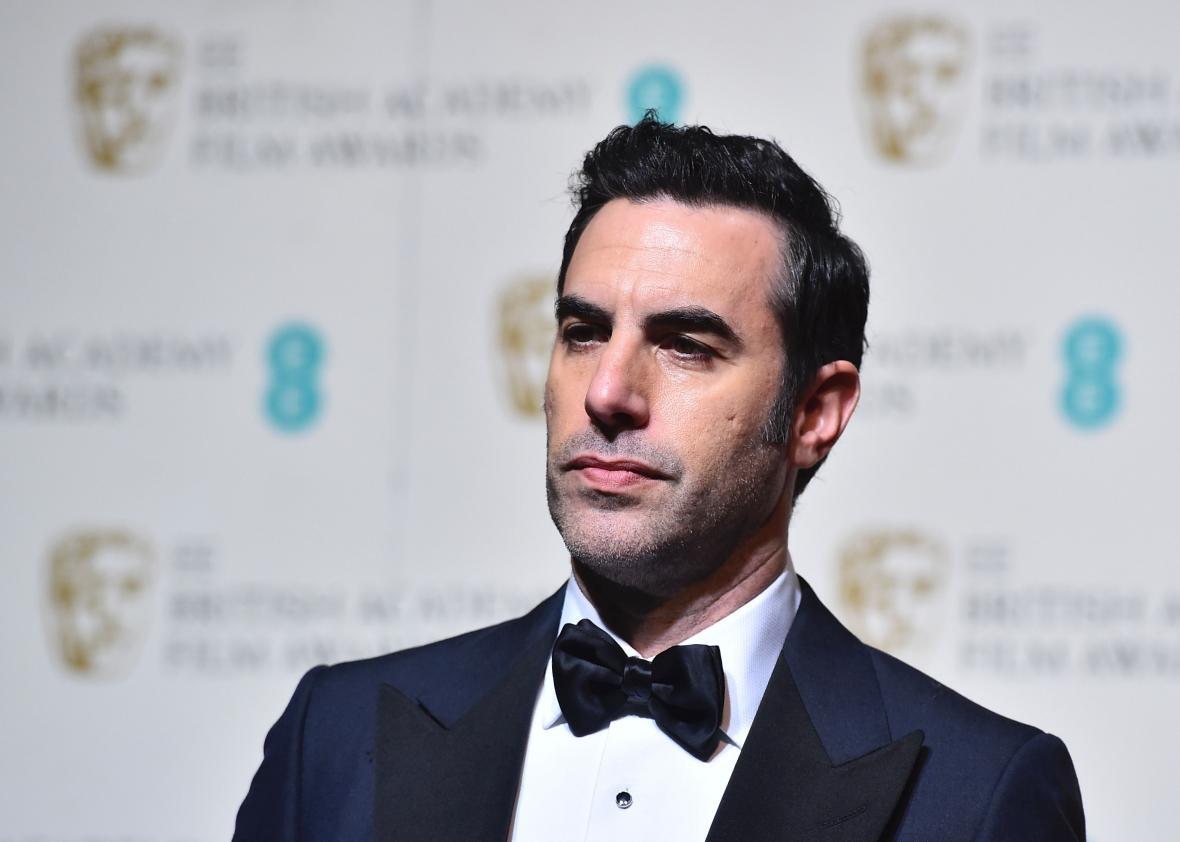“Straight or gay… they’re silly terms because it’s a scale, and everyone is somewhere on the scale,” the actor Sacha Baron Cohen said recently while appearing on WTF with Marc Maron. “I’m 23 percent gay. I’ve worked it out, I did the calculations. I’m 23 percent gay. There are times I go down to 17, times I go up to 31. When I was doing Borat and I had the testicles on my chin, I was at 31. Everyone’s on that scale somewhere.”
Like an increasing number of (often heterosexual) public figures, Cohen apparently feels qualified to pronounce on the usefulness of “labels” like gay, lesbian, or bisexual—even queer. Instead of these now-passé terms, the actor (who, of course, has made money off playing gay characters for laughs) endorses the concept of sexual fluidity, forever slipping and sliding along a “scale.” Setting aside the idea that having someone’s balls on your chin while filming a movie is what constitutes being gay, does Cohen have a point? There are, of course, people who experience sexual fluidity, and that’s great. But for the rest of us, are labels really so awful?
Cohen joins the esteemed ranks of Cate Blanchett and Matt Damon in discounting the significance of sexuality and sexual labels. “In 2015 the point should be: who cares?” Blanchett said in May last year. (Upon the Cannes premiere of Carol, she told Variety that she had had same-sex relationships in her life “many times,” only to claim a week later she was misquoted.) “My life is of no interest to anyone else. Or maybe it is, I don’t know. But I’m certainly not interested in putting my thoughts and opinions up there.”
Damon, meanwhile, told The Guardian in September, “I think you’re a better actor the less people know about you period. And sexuality is a huge part of that. Whether you’re straight or gay, people shouldn’t know anything about your sexuality.”
This notion that sexuality should be hushed up and labels done away with is terribly en vogue, including among those who have chosen to ostensibly come out … as nothing in particular. George Shelley of the British boyband Union J said in February that he’d had boyfriends and girlfriends in the past, but didn’t want to “make a big thing out of it” or worry about “the label thing.” Actress Kristin Stewart more or less refused to come out in an interview with Nylon last September. “But I am an actress, man. I live in the fucking ambiguity of this life and I love it,” she said.
And this is, of course, not merely a celebrity trend. Research presented by The Innovation Group found that members of Generation Z (those aged 13 to 20) are far less likely than even Millennials to identify themselves as ‘completely heterosexual,’ with 35 percent of those surveyed choosing to place themselves somewhere on a scale of bisexuality.
Recognition of the spectrum of experiences and the ability to live without labels is a rightful part of sexual liberation, of course; but this rush to abandon labels altogether is a gross mistake. In part, it stems from an erroneous belief that the work of the LGBTQ rights movement has somehow been concluded. The logic goes like this: The cases of Windsor and Obergefell put right the major injustices against gays and lesbians in the American legal system; what issues remain are inconsequential and soon to be solved anyway; and therefore we would be better off not ‘constantly talking’ about our sexuality (to paraphrase Blanchett) in this new age of enlightenment free of labels and distinctions.
But whether we’re talking about housing discrimination in the United States, laws on ‘homosexual propaganda’ in Russia, or the jailing of gay men in Uganda, it is evident that these labels do still matter—at least outside of privileged, largely urban parts of the West. Try telling those attacked by thugs at the Kino Kriterion in Sarajevo earlier this month—one of the few LGBTQ-friendly clubs left in Bosnia-Herzegovina’s capital—or the 24-year-old gay man stabbed twenty-times in his apartment in Kiev on Friday that labeling oneself as gay is ‘silly.’
Additionally, being gay is not merely a descriptor of preference—it is a political position, a statement of solidarity and peoplehood, the subject of discrimination and persecution, and, in some extreme cases, a matter of life and death. To use a label like gay or queer is to stand for something and with someone. To opt out of the use of labels, or to negate or minimize their importance, is to try and live a non-political existence. It is a folly to deny one’s status as a minority and all the political baggage that comes with it.
It leaves the difficult and laborious work of campaigning for LGBTQ rights to those who choose to identify with a label, thereby undermining the very basis upon which queer activism is constructed—namely fraternity between groups who have historically been subjugated and discriminated against on the basis of their sexual orientation (or gender identity). By extension, living without labels is also an attempt to avoid the discrimination or stigma that can come with identifying as gay by trying to slip under the radar or “pass.”
LGBTQ labels are also a form of cultural and historical identification: As my colleague J. Bryan Lowder has written about extensively, gayness (to take one example), “also comprises a set of markers or values or practices that manifest themselves in the spaces and objects and relationships that gay men create.” It is much more, then, than just sex—as some of these all-too-outspoken celebrities or callow youths would have it. Gay, lesbian, bisexual, and queer are not mere ‘silly terms,’—they contain political power, deep history, and even a kind of communal beauty. We’d do well to remember that amid calls to throw them out as if they were last year’s fashion.
